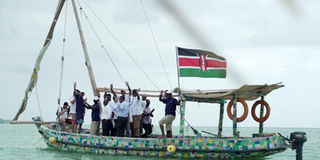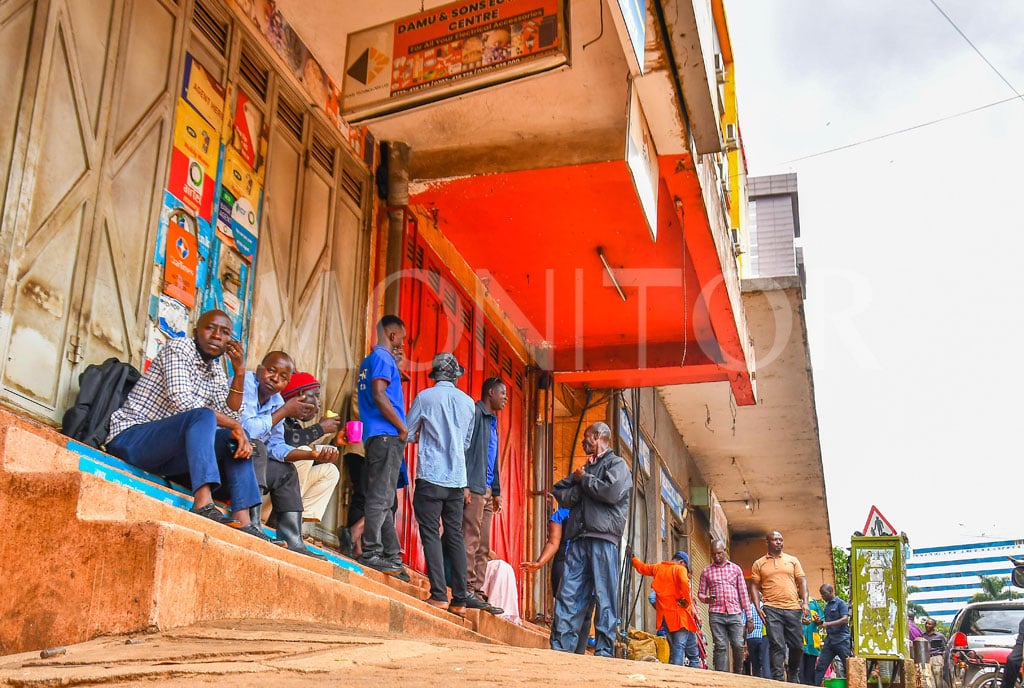Flipflopi expedition: A quest to rid the lake of plastic waste

The plastic boat making its way to Lamu Island in Kenya. Courtsey Photos
What you need to know:
- Plastic waste in seas and oceans is now a global issue that can no longer be ignored. The flipflopi expedition will be undertaken by a group of people using a boat that has been built using plastic recycled from the lake. The boat will traverse countries in East Africa drawing attention to the adverse effects of plastic not only to marine life but to the people that consume it.
In a study of micro plastics pollution in African lakes, a variety of polymers, including polyethylene, polypropylene, and silicone rubber, were recovered from the gastrointestinal tracts of Nile perch and tilapia caught from Lake Victoria.
The study also states that 20 per cent of each of the above fish species contained confirmed micro plastics within their gastrointestinal tracts.
This means that plastic at some point breaks into smaller pieces and is eaten by the fish.
Although some of the fish die, many survive and are eaten by human beings thereby spreading the effects of the said plastics.
Luckily, a number of projects are now being put in place to not only raise awareness but also come up with long lasting ways to rid the lakes of harmful plastics.
Flipflopi expedition
Coming from a sailing boat (dhow), made entirely from plastics (more with flip flops or sandals in this case) covered in 30,000 flip flops, the flipflopi expedition is a project aimed at recycling, getting rid of plastics from lakes, rivers and oceans.
On January 24, 2019, a plastic boat set sail from Lamu Island in Kenya before crossing into northern Tanzania, with its final stop in Stone Town, Zanzibar. The main aim of this trip was to create awareness on the more than 12 million tonnes of plastic being dumped in the ocean every year.
“We support the global campaign against single use plastic and run expeditions to raise awareness and catalyze behavioural and legislative change. For more than six weeks in July and August, we plan to sail and cover a considerable distance on Lake Victoria, reaching all the East African countries,” says Shyam Radia, partnerships director, flipflopi expedition.
Radia adds that the sole purpose of the Lake Victoria expedition is to draw awareness to the impact of effluents being discharged into Lake Victoria, Africa’s biggest freshwater lake, and the harm they have on the environment, economy and people’s health.
Why Lake Victoria?
Lake Victoria supports more than 40 million people and with a huge amount of plastic being dumped in the lake, there is need to build a richer consensus among East African countries so as to address pollution by plastics.
“We thought if we sail around the lake and reach countries such as Uganda, Kenya and Tanzania, we will be able to create awareness and engage the citizens of these countries on the effects of plastic and this will hopefully lead to behavioural change and legislation towards this cause as well,” Radia says.
He adds that since Lake Victoria is the third largest lake in the world by area, traversing it is the perfect opportunity to enhance the conversation of waste management on the lake.
Petition
To enable awareness, the expedition has launched a petition that will help to make the expedition a success.
“As part of the Lake Victoria Expedition, we aim to collect one million signatures in the East African Community to advocate for an end to specific single use plastic items - we will be launching this petition later this year.” Radia says.
Anyone ready to fight and support this cause can sign the petition, which will be circulated to different individuals through different media platforms such as websites and Facebook, among others.
Once all the signatures have been collected, the petition will then be presented to the East African Community in order for it to be translated in accordance with law on EAC level and down to each country.The petition should be ready and signed by the time the Flipflopi expedition kicks off in July.
Funding
The flipflopi expeditions has members who currently rely on donations from individuals and organisations that support and believe in the cause.
“We are currently organising meetings with a number of businesses and conservationists to discuss the project and their potential participation,” Radia says.
Rebecca Faber, the head of communication, flipflopi expedition, says while in Uganda, the expedition representatives are on the search for partners can also be part of the journey.

A close up of the plastic boat.
“The message has been seen by a lot of people and some have already come in to help. For example, in Kenya, President Uhuru Kenyatta and a number of hotels have already offered their help. Although we do not have a lot of money, help from such people and other volunteers has kept us going,” Faber says.
The plastic problem
During the World Environment Day celebrations held in Mbale Town in June 2018, President Museveni referenced an earlier ban on the use of plastic bags that had failed to take effect.
He had earlier ordered 45 plastic manufacturers to stop making polythene bags.
The theme of the day, “Beat plastic pollution” might as well be put into practice by using it to support upcoming and already existing projects on environmental conservation. For example, in Kamwokya, Kampala, projects have come up where plastic bottles are used to build houses.
Since using bottles as bricks rids the environment of plastics, the Flipflopi expedition rids fresh waters, starting with Lake Victoria of plastics that include flip flops (sandals).
Melt or burn plastic?
Burning plastic in an open fire is poisonous, but how is melting different?
Patrick Mujuzi, the Chief Executive Officer of Ghetto Research Lab in Kamwokya, Kampala, says burning releases gas emissions, leads to a black hard smoke which is not good for the environment and people’s health.
However, with melting, plastic is not exposed to direct fire which minimises the amount of bad smoke released.
“Plastic has a different pH. We get those that have the same pH, and melt them together to get a uniform product,” Mujuzi says.
Plastic changes the acidity of the water, kills birds and affects the climate as well as the acidity and balance of the ecosystem. While plastic can be recyclable, in our case that is hardly the norm- until we learn that proper disposal of these plastics solely begins with ourselves.




